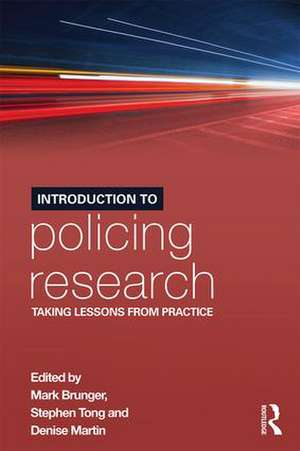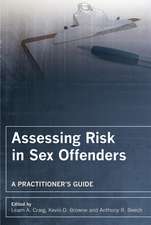Introduction to Policing Research: Taking Lessons from Practice
Editat de Mark Brunger, Denise Martin, Stephen Tongen Limba Engleză Paperback – 26 noi 2015
As an introduction to the theoretical explanations and assumptions that underpin the rationale of research design in policing, this book clearly illustrates the practical and ethical issues facing empirical research in a policing context, as well as the limitations of such research. Introduction to Policing Research brings together a range of leading scholars who have a wide range of experience conducting police research. Topics covered include:
- professional development,
- police culture,
- policing protests,
- private policing,
- policing and diversity,
- policing in transition,
- policing and mental health,
- policing and sensitive issues.
| Toate formatele și edițiile | Preț | Express |
|---|---|---|
| Paperback (1) | 391.23 lei 6-8 săpt. | |
| Taylor & Francis – 26 noi 2015 | 391.23 lei 6-8 săpt. | |
| Hardback (1) | 1144.77 lei 6-8 săpt. | |
| Taylor & Francis – 30 noi 2015 | 1144.77 lei 6-8 săpt. |
Preț: 391.23 lei
Nou
Puncte Express: 587
Preț estimativ în valută:
74.90€ • 77.03$ • 62.13£
74.90€ • 77.03$ • 62.13£
Carte tipărită la comandă
Livrare economică 20 februarie-06 martie
Preluare comenzi: 021 569.72.76
Specificații
ISBN-13: 9781138013292
ISBN-10: 1138013293
Pagini: 246
Ilustrații: 2 black & white illustrations, 2 black & white tables, 2 black & white line drawings
Dimensiuni: 156 x 234 x 13 mm
Greutate: 0.34 kg
Ediția:1
Editura: Taylor & Francis
Colecția Routledge
Locul publicării:Oxford, United Kingdom
ISBN-10: 1138013293
Pagini: 246
Ilustrații: 2 black & white illustrations, 2 black & white tables, 2 black & white line drawings
Dimensiuni: 156 x 234 x 13 mm
Greutate: 0.34 kg
Ediția:1
Editura: Taylor & Francis
Colecția Routledge
Locul publicării:Oxford, United Kingdom
Public țintă
Postgraduate and UndergraduateCuprins
Foreword, Robert Reiner 1. Introduction to Policing Research, Mark Brunger, Denise Martin & Steve Tong Policing Research in Context 2. Beyond contrasting traditions in policing research?, Peter Squires 3. ‘Policing at a Turning Point: Implications for Research’, Maurice Punch, Auke van Dijk and Frank Hoogewoning 4. Conceptualising Private Policing, Alison Wakefield 5. Policing and Mental Health, Kristina Massey 6. Policing in Northern Ireland: Research, Meaning and Lessons From a Contested Landscape, John Topping 7. Researching Professional Development, Dominic Wood and Robin Bryant 8. Watching the Detectives: Researching Investigative Practice, Katja Hallenberg, Martin O’Neill & Steve Tong Inside Policing 9. Researching Sexual Violence, Emma Williams & Betsy Stanko 10. From the Briefing Room to the Classroom: The Pedagogical Value of Researching Police Elites, Mark Brunger, Bryn Caless, Steve Tong, & Paul Gilbert 11. Policing Protest: Public Order Policing, Denise Martin and William Graham 12. Outsiders Inside: Ethnography and Police Culture, Louise Westmarland 13. Researching Police Diversity, Michael Rowe 14. The Ethics of Researching the Police: Dilemmas and New Directions, Layla Skinns, Andrew Wooff and Amy Sprawson 15. Researching Sexuality and Policing: Reflections from the Field, Matthew Jones 16. Conclusion: Challenges and Changes in Police Research, Denise Martin & Steve Tong.
Notă biografică
Mark Brunger received his PhD from Queen’s University Belfast in 2010 and was a Senior Lecturer in Policing Studies at Canterbury Christ Church University, UK. He published on issues of neighbourhood and community policing, covering both the UK and Northern Ireland in journals such as: The International Journal of Semiotics of Law, Criminal Justice Matters, Crime Prevention and Community Safety, Crime, Law and Social Change and Fortnight. He was a key contributor to the teaching of modules on the BSc (Hons) degree in Policing and Police Studies (pre-service), aimed at students intending to pursue a career in policing. His expertise and research interests lay in police accountability, police professionalisation, the use of multi-agency partnerships and the application of ethnographic research methods.
Stephen Tong is Director of Policing and Criminal Justice at Canterbury Christ Church University, UK. He has contributed to the development of the policing curriculum at the university at undergraduate and postgraduate level over the past thirteen years. He contributed to the Independent Stevens' Commission on the future of policing (2013), the Blackstone's Handbook for Policing Students (an annual publication) and articles on various policing issues. His research interests include: investigative practice, police cooperation and leadership, professionalisation, police training and education.
Denise Martin is a Senior Lecturer in Criminal Justice and Criminology at the University of the West of Scotland, UK. She completed her PhD research on Best Value Policing at Middlesex University in 2004. Denise has conducted research on a range of topics within both the prison and the police service. Denise is a member of the Scottish Institute of Policing Research.
Stephen Tong is Director of Policing and Criminal Justice at Canterbury Christ Church University, UK. He has contributed to the development of the policing curriculum at the university at undergraduate and postgraduate level over the past thirteen years. He contributed to the Independent Stevens' Commission on the future of policing (2013), the Blackstone's Handbook for Policing Students (an annual publication) and articles on various policing issues. His research interests include: investigative practice, police cooperation and leadership, professionalisation, police training and education.
Denise Martin is a Senior Lecturer in Criminal Justice and Criminology at the University of the West of Scotland, UK. She completed her PhD research on Best Value Policing at Middlesex University in 2004. Denise has conducted research on a range of topics within both the prison and the police service. Denise is a member of the Scottish Institute of Policing Research.
Recenzii
‘The highly-regarded researchers contributing to this book provide personal, critical insights into the hazards and rewards of researching the police. Their case studies are a rich source of practical, technical and ethical advice when solving problems such as gaining access, choosing appropriate methods, handling sensitive subject matter and negotiating publication of results. Especially effective is the discussion of the value and pitfalls of evidence -based practice and the professionalization of policing and police. This collection is an invaluable resource for those who commission, undertake or apply the results of research endeavours.’
Jennifer Brown, Co-Director of the Mannheim Centre for Criminology and Criminal justice, Visiting Professor, London School of Economics, UK
‘At a time when the relationship between research evidence and the practice of policing is in the spotlight, this book is a very valuable and insightful contribution. With chapters written by leading policing scholars who know from direct experience the challenges and rewards of undertaking policing research, this book manages to offer a breadth of coverage and a depth of analysis which all those working in this field will draw huge benefit from.’
Professor Nicholas R Fyfe, Director of the Scottish Institute for Policing Research & Associate Dean, School of Social Sciences, University of Dundee, UK
Jennifer Brown, Co-Director of the Mannheim Centre for Criminology and Criminal justice, Visiting Professor, London School of Economics, UK
‘At a time when the relationship between research evidence and the practice of policing is in the spotlight, this book is a very valuable and insightful contribution. With chapters written by leading policing scholars who know from direct experience the challenges and rewards of undertaking policing research, this book manages to offer a breadth of coverage and a depth of analysis which all those working in this field will draw huge benefit from.’
Professor Nicholas R Fyfe, Director of the Scottish Institute for Policing Research & Associate Dean, School of Social Sciences, University of Dundee, UK
Descriere
As an introduction to the theoretical explanations and assumptions that underpin the rationale of research design in policing, this book clearly illustrates the practical and ethical issues facing empirical research in a policing context, as well as the limitations of such research.
This book is perfect for undergraduate and graduate students on policing degrees, as well as graduate students and researchers engaged with criminal justice. It is also essential reading for police officers taking professional and academic qualifications.
This book is perfect for undergraduate and graduate students on policing degrees, as well as graduate students and researchers engaged with criminal justice. It is also essential reading for police officers taking professional and academic qualifications.












